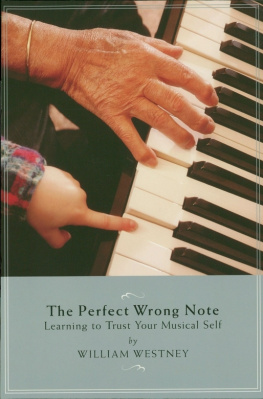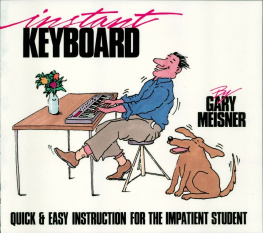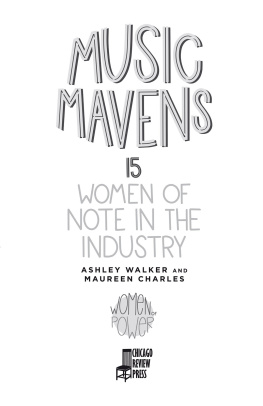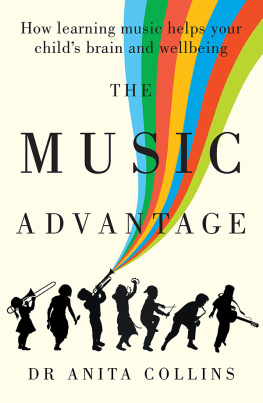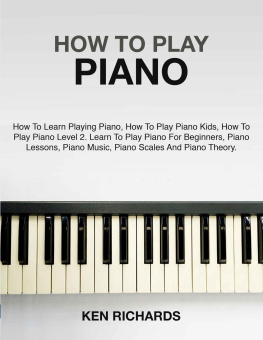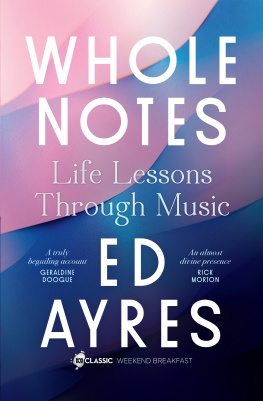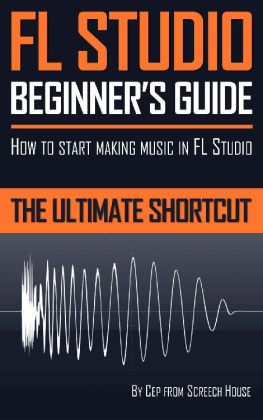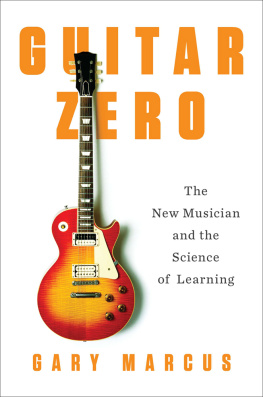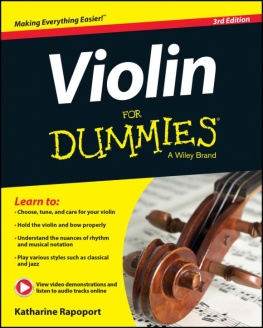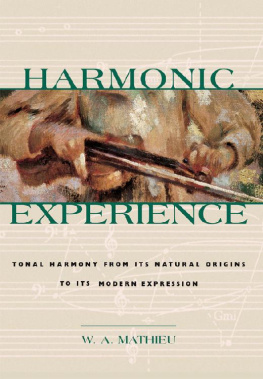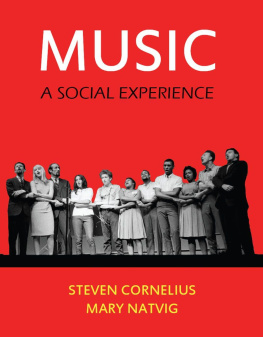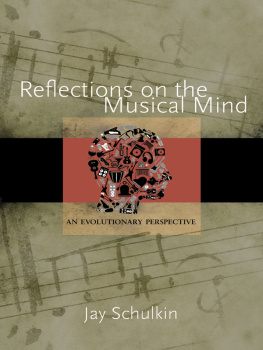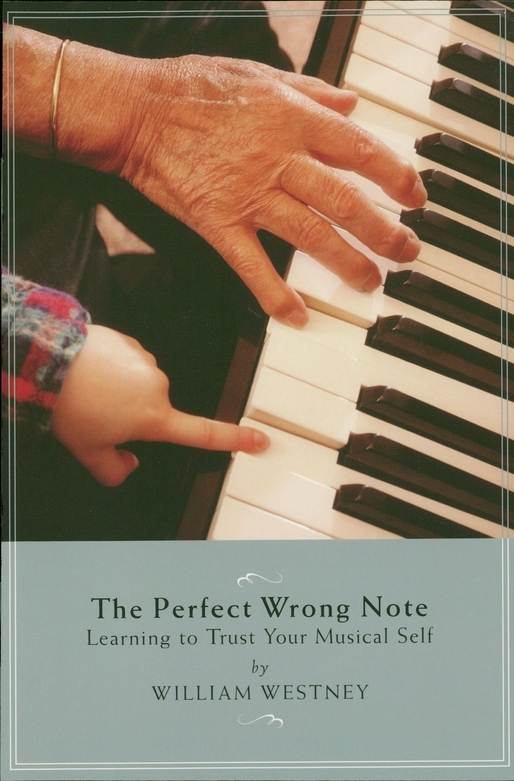William Westney holds two endowed faculty positions at Texas Tech University: Paul Whitfield Horn Distinguished Professor and Browning Artist-in-Residence. He has been honored with many professional awards as educator and artist, including the Yale School of Music Alumni Associations prestigious Certificate of Merit, for his distinctive and innovative contributions to the teaching of musical performance. Westneys acclaimed Un-Master Class performance workshop, which has been featured in The New York Times, is increasingly in demand in the United States and abroad. An active concert pianist, he has won the Geneva International Competition and holds masters and doctorate degrees in performance from Yale University.
Bibliography
Adams, Noah. 1996. Piano Lessons: Music, Love, and True Adventures . New York: Random House.
Berman, Morris. 1981. The Reenchantment of the World . New York: Cornell University Press.
Booth, Wayne. 1999. For the Love of It . Chicago: University of Chicago Press.
Briggs, John, and David F. Pear. 1989. Turbulent Mirror: An Illustrated Guide to Chaos Theory and the Science of Wholeness . New York: Harper & Row.
Brown, Kenneth A. 1988. Inventors at Work . Redmond, Washington: Tempus Books of Microsoft Press.
Chase, Stuart. 1966. The Tyranny of Words . San Diego: Harvest HBJ.
Clark, Ronald W. 1971. Einstein: The Life and Times . New York: World Publishing Co.
Cobb, Edith. 1959. The Ecology of Imagination in Childhood. Daedalus 88 (3).
Coulter, Dee. 1989. The Inner-Dynamics of Creativity . Boulder, Colorado: Sounds True Recordings. Audiotape.
De Mille, Agnes. 1981. Reprieve: A Memoir . Garden City, New York: Doubleday.
Doyle, Sir Arthur Conan. 1930. A Study in Scarlet in The Complete Sherlock Holmes. Garden City, New York: Doubleday.
Edwards, Betty. 1979. Drawing on the Right Side of the Brain. Los Angeles: J. P. Tarcher.
Edwards, Betty. 1999. The New Drawing on the Right Side of the Brain. New York: Tarcher/Putnam.
Fay, Amy. 1880. Music-Study in Germany. Chicago: A. C. McClurg & Co.
Ferguson, Marilyn. 1980. The Aquarian Conspiracy. Los Angeles: J. P. Tarcher.
Feynman, Richard. 1985. Surely Youre Joking. Mr. Feinman! New York: W. W. Norton.
Fisher, Marla Jo. 2001. Study Finds that Choral Singing Boosts Production of Antibodies that Fight Disease. The Voice of Chorus America Newsletter (Summer). http://www.chorusamerica.org/voice_article_health.shtml
Foldes, Andor. 1948. Keys to the Keyboard. New York: E. P. Dutton.
Gallwey, W. Timothy. 1974. The Inner Game of Tennis. New York: Random House.
Gardner, Howard. 1982. Art, Mind and Brain. New York: Basic Books.
Gieseking, Walter, and Karl Leimer. 1932. Piano Technique: The Shortest Way to Pianistic Perfection. London: Schott.
Guinness, Alec. 1985. Blessings in Disguise. New York: Warner Books.
Hagen, Steve. 1997. Buddhism Plain and Simple. New York: Broadway Books.
Hampden-Turner, Charles. 1981. Maps of the Mind. New York: Collier Books.
Heinlein, Robert A. 1991. Stranger in a Strange Land. New York: Putnam.
Hoffman, Eva. 1989. Lost in Translation. New York: E. P. Dutton.
Hofstadter, Douglas. 1979. Gdel, Escher, Bach: An Eternal Golden Braid. New York: Basic Books.
Holland, Bernard. 1999. Star Turns by Star Teachers: Classes in the Callas Tradition. The New York Times (January 27).
Holt, John. 1978. Never Too Late. New York: Delacorte Press.
Houston, Jean. 1982. The Possible Human. Los Angeles: J. P. Tarcher.
Huizinga, Johan. 1980. Homo Ludens: A Study of the Play-Element in Culture. London: Routledge & K. Paul.
Huxley, Aldous. 1954. The Doors of Perception. New York: Harper & Row.
Huxley, Aldous. 1977. The Human Situation. New York: Harper & Row.
Kamen, Robert Mark. 1984. The Karate Kid. Burbank, California: Columbia Tristar Home Video. Videorecording.
Koga, Midori, and Frederick Tims. 2001. The Music Making and Wellness Project. American Music Teacher (October/November).
Krishnamurti, J. 1982. The Network of Thought. San Francisco: Harper & Row.
Langer, Susanne K. 1951. Philosophy in a New Key. Cambridge, Massachusetts: Harvard University Press.
Lao Tzu. 1944. The Way of Life. Trans. Witter Bynner. New York: Putnam.
Matthay, Tobias. 1913. Musical Interpretation, Its Laws and Principles, and Their Application in Teaching and Performing . Boston: The Boston Music Co.
McCluggage, Denise. 1983. The Centered Skier . New York: Bantam Books.
Music for People. 2001. A Bill of Musical Rights. http://www.musicforpeople.org/connect/rights.html. Accessed 10 October 2002.
Nachmanovitch, Stephen. 1990. Free Play: Improvisation in Life and Art . Los Angeles: Jeremy P. Tarcher.
Newman, William S. 1984. The Pianists Problems . New York: Da Capo Press.
Perls, Frederick S. 1969. Gestalt Therapy Verbatim . Moab, Utah: Real People Press.
Pert. Candace B. 1997. Molecules of Emotion . New York: Scribner.
Polanyi, Michael 1969. K nowing and Being . Chicago: University of Chicago Press.
Prisons. 1992. The Sun (February).
Raban, Jonathan. 1991. Hunting Mister Heartbreak . New York: Harper Collins.
Rehak, Melanie. 1999. A Joyful Noise: How to Practice Without Hope of Perfection. The New York Times Magazine (April 11).
Ristad, Eloise. 1982. A Soprano on Her Head . Moab, Utah: Real People Press.
Rogers, Carl. 1961. On Becoming a Person . Boston: Houghton Mifflin.
Sacks, Oliver. 1985. The Man Who Mistook His Wife for a Hat and Other Clinical Tales. New York: Summit Books.
Samples, Bob. 1976. The Metaphoric Mind: A Celebration of Creative Consciousness . Reading, Massachusetts: Addison-Wesley.
Sand, Barbara Lourie. 2000. Teaching Genius: Dorothy DeLay and the Making of a Musician . Portland, Oregon: Amadeus Press.
Schaef, Anne Wilson. 1987. When Society Becomes an Addict . New York: Harper & Row.
Spock, Benjamin. 1945. The Common Sense Book of Baby and Child Care . New York: Duell, Sloan and Pearce.
Whone, Herbert. 1974. The Hidden Face of Music . London: Gollancz.
Postscript A word to Health Professionals
Conservatories and symphony orchestras, as many are aware, are rife with hurting and injured musicians. To realize that music-making itself has caused painful, chronic bodily harm is devastating, depressing, and scary for anyone who has been devoted to the musical art and who has invested in it professionally and worked for years at mastering its craft. On top of that, such injuries can precipitate a major identity crisis (if I was born to be a musician, how could this be happening?).

